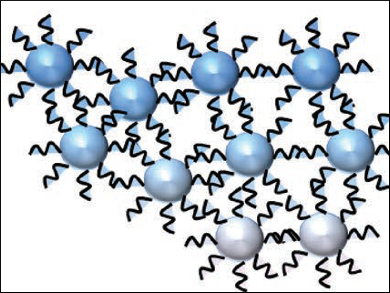The most common symptom of bladder cancer is hematuria (blood in the urine). In order to rule out bladder cancer, if blood is found in the urine, cystoscopy and urinary tract imaging are recommended for all patients. However, only 10 to 30 % of patients are diagnosed with bladder cancer after a full evaluation. Hence, a large number of patients unnecessarily undergo an invasive and expensive procedure.
Steven R. Little, University of Pittsburgh, PA, USA, and colleagues have developed a non-invasive clinical assay to detect bladder cancer. The team uses matrix metalloproteases (MMPs) as a target for their test. These zinc-dependent proteolytic enzymes degrade the extracellular matrix of cells and are significantly increased in the urine of patients with bladder cancer.
The team’s test for MMPs uses a substrate (pictured) which is generated by cross-linking gelatin with Fe(II)-chelated alginate nanoparticles, which precipitate in the urine samples. The cleavage of the gelatin-conjugated alginate nanoparticles by MMPs generates free-floating alginate/Fe(II) nanoparticles. These free particles can participate in Fenton’s reaction and generate a color shift from purple to yellow. In a trial, the essay was shown to be 100 % sensitive and 85 % specific. It has a negative predictive value of 100 % for diagnosing bladder cancer.
- An Inexpensive, Point-of-Care Urine Test for Bladder Cancer in Patients Undergoing Hematuria Evaluation,
Abhinav P. Acharya, Kathryn M. Theisen, Andres Correa, Thiagarajan Meyyappan, Abraham Apfel, Tao Sun, Tatum V. Tarin, Steven R. Little,
Adv. Healthcare Mater. 2017.
DOI: 10.1002/adhm.201700808



